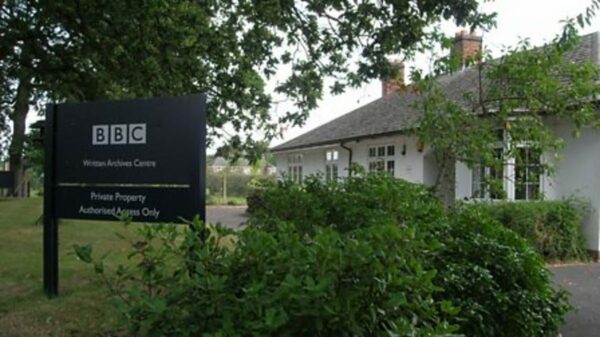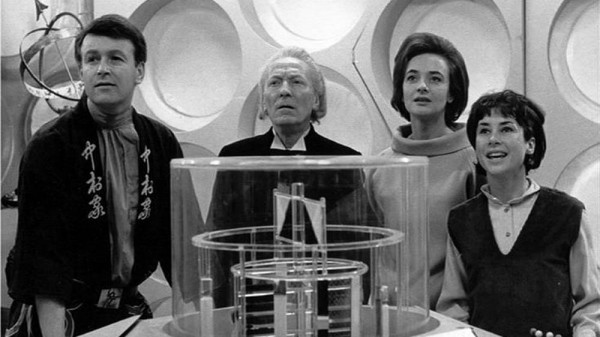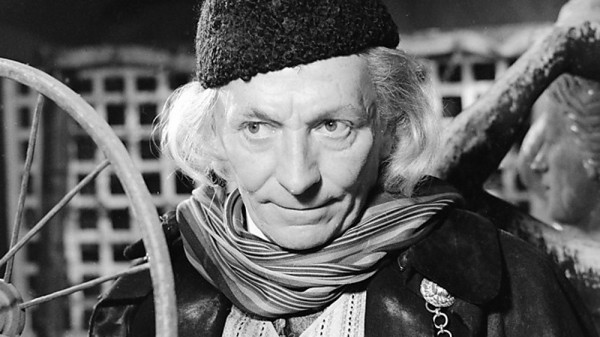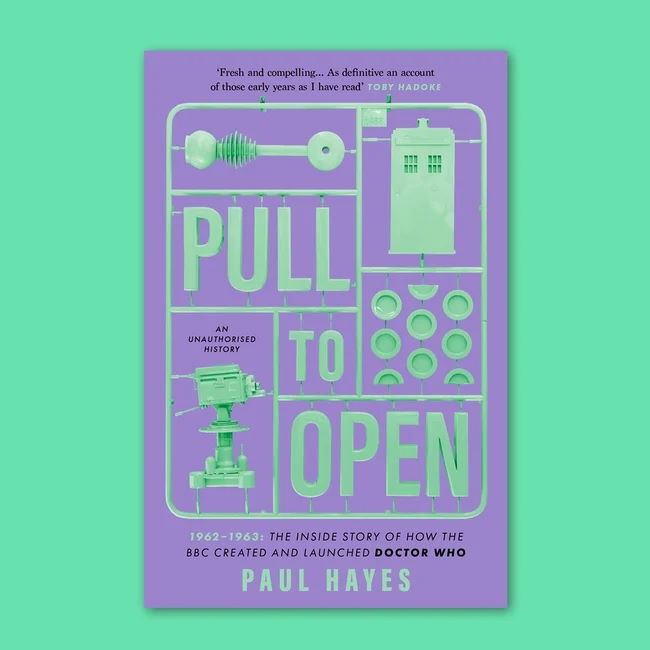Pull To Open: 1962–1963: The Inside Story of how the BBC created and launched Doctor Who is out now.
Writer and broadcaster Paul Hayes is no stranger to the arcane world of television show development. In 2021, his excellent book The Long Game painstakingly pieced together Doctor Who‘s complicated journey back to our screens in 2005.
Now for what feels like a companion piece, Paul has turned his attention to the genesis of the programme. For Pull to Open, he has immersed himself archive material to chart the show’s journey from conception to transmission.
We’ve been lucky enough to put a few questions to him.
CultBox: The story of Doctor Who‘s beginnings has been considered in various forms over the years. What attracted you to focus on this period for Pull To Open?
Paul Hayes: It’s been a period in Doctor Who’s history, and indeed in wider television and BBC history, which has absolutely fascinated me since I was a child – partly because of many of those previous works, such as The Sixties and The First Doctor Handbook by Howe, Stammers and Walker. I think the beginning of any great social or cultural institution is fascinating – seeing the chain of events which led to the emergence of something which retrospectively feels inevitable, because it’s such a big part of our lives. Like how a major band came together, The Beatles or Queen for example. There’s a tremendous pull to those ‘origin stories’. It’s why they’re so popular in fiction, too – seeing how a major, well-loved character came to be who they are.
Basically, I began to wonder whether the story of Doctor Who’s creation could perhaps be told in more detail than is usually the case. Making the creation and launch of the show not just the start of the story, but the story itself. That gives you so much more time and space to provide more context and background to the events, and perhaps try and give a bit more detail about the lives of some people who are just names on a list a lot of the time.
One of the things which people really seemed to enjoy about The Long Game, and which I was very deliberately trying to do with it, was to help explain the BBC and British television environment which caused these things to happen. So not just saying that these things did happen, but trying to explain why they happened. That’s very much the same approach Pull to Open takes – trying to give more of an explanation about the people, places and institutions involved in these events.
CB: Given the time period involved, we imagine there were (sadly) far fewer people to interview in person than for ‘The Long Game’. Did this alter your approach?
PH: Yes, inevitably that was the case. I did over thirty new interviews for The Long Game, whereas for Pull to Open I only did three. I did try hard to scour as many sources as possible though to provide relevant quotes from archive interviews with the important figures from throughout the story – newspaper interviews, Doctor Who Magazine interviews, BBC Oral History interviews, DVD audio commentaries and documentaries, all that kind of thing.

There was, of course, once advantage with this project that The Long Game didn’t have, and that was access to the documents concerning the early development of the series held by the BBC Written Archives Centre at Caversham. For The Long Game the events were too recent for any internal BBC documentation to be accessible for research, but with Pull to Open obviously those files have long been open to researchers, and of course they’re such a treasure trove. So it’s perhaps more of a ‘documentary’ approach than with The Long Game, but that does make it easier to precisely pinpoint when certain things happened.
CB: Did you bust any long-held pieces of fan wisdom?
PH: Interestingly, given that those documents I mentioned have been open to researchers for thirty years now and have been used as sources many times, I did find something lurking within them which revealed that one oft-stated piece of information was actually mistaken.
It’s mentioned in various places that the first ever shooting specifically for Doctor Who took place on August 20 1963, for the opening titles. It’s certainly true that a piece of paper exists in the files booking a filming session at Ealing for that date… But there’s also another piece of paper from eight days later cancelling it, so it never actually happened. As far as I can tell, nobody had ever spotted that before, although it’s understandable – there is a lot of information on a lot of pieces of paper in those files!
So it’s more small things like that, rather than any major ‘everything you thought you knew is wrong!’ revelations. With, hopefully, as I said, some more background and context about things.
CB: Was there anything that really surprised you during your research?
PH: I don’t think I’d ever really appreciated before the degree to which things were being done to the episodes after they’d been recorded, in those very earliest days, in terms of what we’d now call post-production.
We have this idea, I think, about the earliest years of Doctor Who that it was all basically recorded as-live, and that was it. Which is of course true to a very large degree – the actors would go through the scenes on the Friday evening recording sessions with as few planned breaks as possible, doing long, rehearsed takes as if they were live. And even allowing for any unplanned breaks, they were forbidden by agreements with the actors’ union Equity from taking longer than three times the episode length to record it in, so they only had a 75-minute session in which to get it done.

But they wouldn’t, at the end of that, have the episode ready to go. There was always, right from the very start, an editing session booked for the following Monday evening after each recording. It seems unlikely that this was just a straight top-and-tail and lopping out of any false starts and recording breaks, either. And we know this because there’s a fascinating memo from November 1963 from BBC Enterprises, who were of course the people who sold BBC shows overseas.
It seems that Enterprises had wanted to make their film recordings for selling overseas directly from what was coming out of the studio at Lime Grove on a Friday evening – so, without any intervening generation of tape, which they seemed to have regarded as an undesirable step down in quality. But this memo complains about how, having tried this for the first few episodes, they’ve basically had to give it up because too much was being done to the episodes afterwards; they couldn’t just take what was being done on the Friday night and sell it abroad. They’ve had to resort to making their film recordings from the finished tapes, which they’re clearly not happy about. So there was more being done ‘in post’ even in this era than we usually allow for, I think.
CB: You’ve looked at the birth of both the classic series and also the 2005 relaunch. Is there another period of the show’s history you’d like to investigate?
PH: It would be nice to have a trilogy, wouldn’t it? However, having seemingly ended up specialising in a niche of ‘books with six-figure word counts covering Doctor Who on television in a period when it was (mostly) not being made’, I’m not sure there is a third one which fits into that category!
I don’t have any particular idea for another Doctor Who book, but you never know. I didn’t after The Long Game either, and it was a few months after that had come out before the notion of trying to write that’s become Pull to Open came to me. So perhaps another idea will emerge! If a good possibility strikes me, I’d certainly love to do another one.
The Doctor Who Show podcast
For more on Paul’s book, we can heartily recommended his interview with Rob Irwin of The Doctor Who Show.
Pull To Open: 1962–1963: The Inside Story of how the BBC created and launched Doctor Who is available now from Ten Acre Films, as is The Long Game – 1996-2003: The Inside Story of how the BBC brought back Doctor Who.


